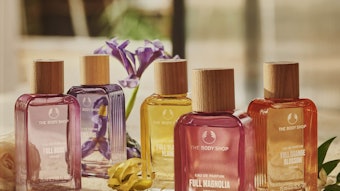In years past, when the fragrance industry was personality driven and there was abundant time and money to spend on new product development, unlimited energies were applied to developing a single creative fragrance benchmark, leaving markedly less to line extensions. But it is a different world, and the dilemma for fragrance supply houses today is the enormous number of requests received not only for designer perfume launches, but the myriad toiletry, bath and body, environmental and household products requiring the addition of a perfume oil to be complete.
Brand owners are facing their own fragrance dilemma. With the numerous consolidations, mergers and buyouts occurring there are fewer suppliers from which to request submissions. Major oil houses have become more selective about who they will work with. Suppliers evaluate whether or not they will do business with a client based on potential poundage of oil, profit margin, creative effort and lab time involved. Bath and body lines can be more difficult and time consuming because of the enormous compatibility problems with a variety of bases with lower percentages of oil usage.
The prestige of the marketer is another enticement for establishing a business relationship. The large finished goods companies tend to have a monopoly on the major fragrance houses, often producing trends with some of the specialty products while giving new twists and innovation to fragrance types.
So, how does a new company compete for the creative services of a major fragrance house? The answer is: with great difficulty. In the closed industry of perfumery it often takes a little homework and networking to find the right partner and get to the right salesperson to request submissions.
Seeking Solutions
One way to get the attention a product needs from a qualified fragrance house is to explore the numerous small boutique firms. Mane, drom, Fragrance Resources, as well as Takasago—all having great turnaround time and concentrated staff circles—will service smaller companies, but even here there is a limit on the perfumer’s time and the creative services for a smaller client. When return on investment is the bottom line for determining how much it will cost to do business with a potential customer, what chance is there of winning against the competition? Minimum poundage orders are also a big factor in deterring a small company from producing a fragrance line.
The client company is often evaluated as to its potential based on the market and price point being targeted. IFF Express established a computerized system that allows small customers to select the type of shelf fragrance they feel will be appropriate to their product. Givaudan also has a similar library of shelf fragrances.
With the average lifespan of a major fragrance launch now only two years, suppliers must be ready to keep an extensive library of fragrance formulas. Many of these prototypes provide the fragrancing for the toiletry products seen today, such as the oriental gourmand trend going into bath and body lines. By the same token some of the fresh fruit and vegetable notes, which were used for bath and body lines, have provided the inspiration for some of the major alcoholic perfume successes.
Some of the captive specialty products that give perfumery an exciting new dimension are kept in house for only their perfumers to use, such as hedione once was for Firmenich’s jasmine. The boutique firms give their perfumers an extensive palette of materials to formulate with, but sometimes keeping the cost competitive with these out of house specialties becomes a problem. A request for a similarly smelling formula may disappoint because the submission does not capture some of these specialty notes that give signature to the fragrance.
The industry is seeing increased merger activity among the smaller houses today, with niche and special customer bases being integrated. Symrise was the merger of Dragoco, Haarman & Reimer, Creations Aromatique and Norda. Quest International was formed by Unilever’s buyout of Norda, PPF and Naarden. Unilever sold Quest to ICI and then Quest bought Shaw Mudge for their hair care customer base. Now Givaudan is finalizing its purchase of Quest. The concept of consolidating creative teams, sales forces and management is quite pragmatic, in theory. Customer base expansion and growth of the raw material palette are two immediately positive effects, but in the end, will this benefit the customer? Will servicing get lost in the shuffle, the small customer thrown to the side? Will all of the individual corporate entities become melded and monolithically monopolize a business once individually, to say nothing of interestingly, accorded?
Time Will Tell
In some cases ours is still a personality driven industry, and the fallout is yet to occur. Many of the large suppliers will miss out on serving that one entrepreneur who makes it big. In such a case, the small boutique oil houses will be there to fill in the gap and become a brand’s successful business partner.










